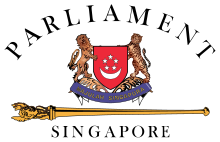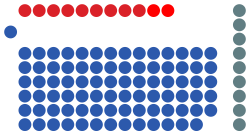
Back برلمان سنغافورة Arabic Parlament de Singapur Catalan Singapurisches Parlament German Parlamento de Singapur Spanish Singaporen parlamentti Finnish Parlement de Singapour French Parlemen Singapura ID Parlamento di Singapore Italian 国会 (シンガポール) Japanese Parlimen Singapura Malay
Parliament of Singapore Parlimen Singapura 新加坡國會 சிங்கப்பூர் நாடாளுமன்றம் | |
|---|---|
| 14th Parliament | |
 | |
| Type | |
| Type | |
| History | |
| Established | 9 August 1965 |
| Preceded by | Legislative Assembly of Singapore |
| Leadership | |
| Structure | |
| Seats | 104[c] |
 | |
Political groups |
|
Length of term | 5 years |
| Salary | S$192,500 annually |
| Elections | |
| First-past-the-post General ticket | |
Last election | 10 July 2020 |
Next election | By 24 November 2025 |
| Meeting place | |
 | |
| Parliament House Downtown Core, Singapore | |
| Website | |
| www | |
The Parliament of Singapore is the unicameral legislature of the Republic of Singapore, which governs the country alongside the president of Singapore. Largely based upon the Westminster system, the Parliament is made up of Members of Parliament (MPs) who are elected, as well as Non-constituency Members of Parliament (NCMPs) and Nominated Members of Parliament (NMPs) who are appointed. Following the 2020 general election, 93 (currently 87)[a][b] MPs and two NCMPs from three political parties were elected to the 14th Parliament. Throughout the sitting of Parliament, nine NMPs are usually appointed by the president on a biennial basis.
The Speaker of Parliament has overall charge of the administration of Parliament and its secretariat, and presides over parliamentary sittings. The Leader of the House is an MP appointed by the prime minister to arrange government business and the legislative programme of Parliament, while the Leader of the Opposition (LO) is the MP who leads the largest political party not in the government. Some of Parliament's work is carried out by select committees made up of small numbers of MPs. Standing select committees are permanently constituted to fulfil certain duties, and ad hoc select committees are established from time to time to deal with matters such studying the details of bills. In addition, selected backbenchers of the governing People's Action Party (PAP), the current largest political party in Parliament, sit on Government Parliamentary Committees (GPCs) that examine the policies, programmes and proposed legislation of government ministries.
The main functions of Parliament are lawmaking, controlling the nation's finances, and ensuring ministerial accountability. Parliament convenes when it is in session. The first session of a particular Parliament commences when Parliament meets after being formed following a general election. A session ends when Parliament is prorogued (temporarily suspended) or dissolved. The maximum term of each Parliament is five years, after which Parliament automatically dissolves. A general election must then be held within three months.
The quorum for a parliamentary sitting is one quarter of the total number of MPs, not including the speaker. An MP begins a debate by moving a motion and delivering an opening speech explaining the reasons for the motion. The speaker (or chairman, if Parliament is in committee) then puts the motion in the form of a question, following which other MPs may debate the motion. After that, the mover may exercise a right of reply. When the debate is closed, the speaker puts the question on the motion to the House and calls for a vote. Voting is generally done verbally, and whether the motion is carried depends on the speaker's personal assessment of whether more MPs have voted for than against the motion. MPs' votes are only formally counted if an MP claims a division.
Parliament first convened at the Old Parliament House between 1955 and 1999, before moving into the current Parliament House on 6 September 1999.
Cite error: There are <ref group=lower-alpha> tags or {{efn}} templates on this page, but the references will not show without a {{reflist|group=lower-alpha}} template or {{notelist}} template (see the help page).
- ^ "Workers' Party MP Raeesah Khan resigns, leaves party a month after lying admission in Parliament". TODAY. 30 November 2021. Archived from the original on 8 December 2021. Retrieved 8 December 2021.
- ^ Parliamentary Elections Act (Cap. 218, 2021 Rev. Ed.) ("PEA"), s. 24(2A).
- ^ "Raeesah Khan resigns: What happens when MPs vacate their seats". TODAY. 1 December 2021. Archived from the original on 8 December 2021. Retrieved 8 December 2021.
- ^ "No by-election in Sengkang GRC after Raeesah Khan's resignation: WP". CNA. 2 December 2021. Archived from the original on 4 February 2022. Retrieved 8 December 2021.
© MMXXIII Rich X Search. We shall prevail. All rights reserved. Rich X Search